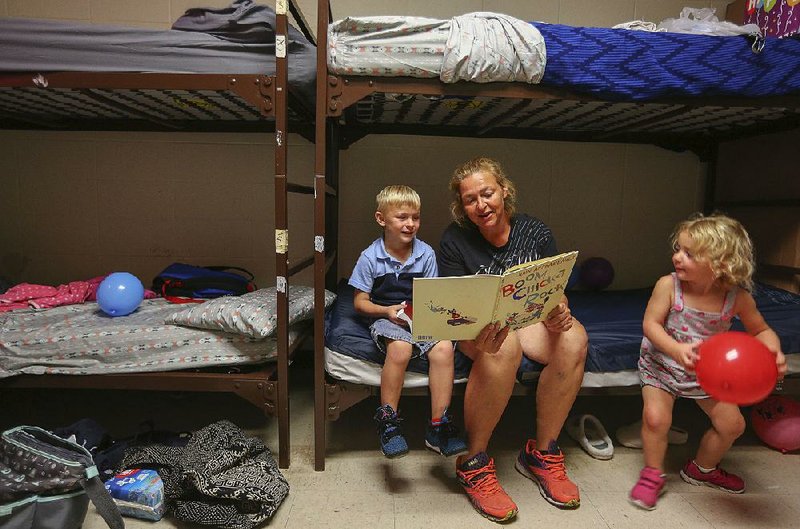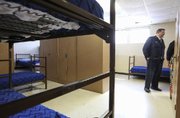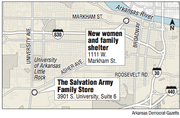The Salvation Army in Little Rock no longer offers bed space for single men who are homeless and has turned its focus instead toward families who are homeless as a part of its national effort to combat poverty that's passed down from generation to generation.
Once home to 33 spaces for single men and only 12 for women, the Salvation Army this summer sent the 16 men staying in the 1111 W. Markham St. shelter to the Compassion Center or Union Rescue Mission to make room for single women and families -- a population that the Salvation Army turns away in the dozens each month while only rarely turning away men.
The Salvation Army's shelter will be able to house at least 70 people when the construction is completed, up from 55 before the changes. Men will still be able to stay at the shelter if they are members of a family staying there.
"This is a major shift for the Salvation Army," Central Arkansas Area Cmdr. Maj. Roger Glick said at a news conference Thursday, noting that the shelter is already near capacity.
Women sometimes end up responsible for children after a relationship ends with their father or if the father ends up incarcerated, said William Tollett, director of development for the Salvation Army's Central Arkansas Area Command. While shelter workers rarely turned away men before the changes, he said, they turned away about 35 to 40 women per month, about 28 women with children per month and about 20 families with both parents per month.
Salvation Army officials said central Arkansas seemed to have a dearth of shelter space for women and children and more than enough most of the time for single men. Our House is another shelter that offers space for women and children, but some other area shelters for women and children are for victims of domestic violence or people with addictions.
Families can go to shelters without space specifically designed for women and children, but people such as Shannon Tate, 40, appreciate the special help they now get at the Salvation Army.
Tate and her five children have been living at the Salvation Army for seven weeks, and caseworkers have helped her find schools and day care for four of her children. Tate is still looking after 6-week-old Coralynn until a space opens in child care at Our House, where the children's father is living.
After that, Tate will look for a job.
"It's all been a positive experience," she said.
The past several weeks have been hard on her children. Tate quit work to go on bed rest during her pregnancy. The children's father lost his job after being arrested -- he has since gotten it back part time -- and the family members lost their home and went to the Compassion Center.
Just before Tate gave birth, the family went to the Salvation Army, where they could get a space held for them after she had Coralynn. But the Salvation Army didn't have a family room open at the time that accommodated a father, so he had to stay at Our House.
Tate plans to arrange for counseling services for her two oldest children, who are 8 and 6.
"This has been a big adjustment for them," she said.
As a part of its new plan to implement the national Salvation Army's Pathway of Hope plan for women and families, the Little Rock shelter will help provide counseling for anyone who needs it. That goes along with addressing the physical, psychological, emotional and spiritual needs of people who stay at the shelter, Glick said.
The Salvation Army will provide financial guidance and other mentoring for women and families to help them get on their feet, Glick said. That, hopefully in turn, will help children learn financial savvy and other life skills that will keep them from needing a shelter again as adults.
Then they can pass those skills on to their own children, Glick said, breaking the generation-to-generation passage of poverty.
The Salvation Army in Little Rock also announced 10 transitional housing apartments to be provided by the local Bailey Family Foundation. Those apartments will be for families who have been designated by their caseworker as ready to begin being self-sufficient.
In October, the Salvation Army will implement its third initiative, a family store at 3901 S. University Ave., Suite 6. Women and families in the Pathway of Hope program will get vouchers for clothing and other household needs, and the store will offer low-cost clothing and household items.
Before schools dismissed Thursday, few women or children could be found at the shelter. Beds were made and empty, toys were stowed and metal wardrobes that separate families were closed.
Children were in schools and day cares -- many of them placed there by Salvation Army staff members -- and parents were working, looking for work or also at school, said Rhonda Tollett, director of social services for the Salvation Army's Central Arkansas Area Command. The Tolletts are husband and wife.
"It gets them off the street," Rhonda Tollett said. "It gets them off couch-surfing. It gets them out of their cars."
Metro on 09/09/2016



